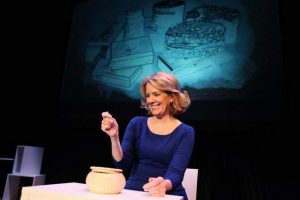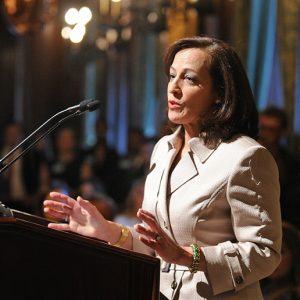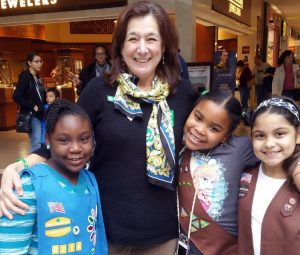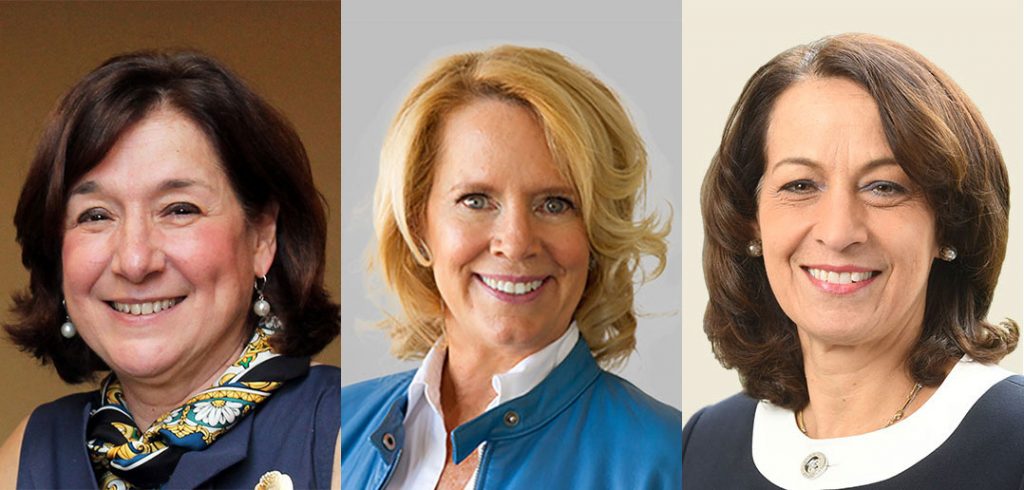Mary Barneby, GABELLI ’80, CEO of the Girl Scouts of Connecticut; Mary Lou Quinlan, GABELLI ’82, an author, actor, entrepreneur, and marketer; and Susan Conley Salice, FCRH ’82, a full-time philanthropist, spoke with FORDHAM magazine about the November 6 summit. They see it as an opportunity for women to network and build community, and to understand how and why women give differently than men.
Though they come from different backgrounds, they’ve each come to the same conclusion: That giving to causes they care about—in whatever way they can—is an essential part of their lives and identities.
Why create a philanthropy summit just for women?
Mary Lou Quinlan: I think the word inaugural is probably the most telegraphic—it’s the fact that Fordham, and this is not uncommon among large institutions, is taking this first step to reach out directly to women. A lot of development work by default (or direction) falls primarily to targeting and engaging men. So I think the pioneering nature of this is powerful. And I’m always excited when women come together to learn, share common experiences, and give back.

Mary Barneby: I also think that we know how important it is for women to feel that they have control over things that are really relevant and important to them, that they have the power and opportunities to make the world a better place and have an impact on generations to come. Women at all stages of their professional and personal lives can be philanthropic. But I think even some women who have larger financial resources sometimes don’t feel they’re entitled or able to make a difference.
Susan Conley Salice: I agree. It’s an incredible opportunity for Fordham to recognize and encourage women to lead, participate, and mentor. We will start that conversation about giving, to lead the way and make a path for women in the Fordham community, and to show how we can make an impact individually but also collectively.
Do women really give and lead differently than men?
MB: Women often come together as a community to give to an important cause; that’s one way we approach giving differently than a guy with a big checkbook.
MLQ: Exactly. To build on that, women see giving as investing. Here, we’re investing in Fordham’s future, in generations to come. And what I’ve observed is men are just quicker to pull the trigger. Boom, that’s it. Women want to trust, to form a relationship, to have a conversation, to really understand the story and the purpose and the outcome of what their giving is for. It’s about being part of a community and understanding how we, uniquely and collaboratively, can have a real effect.
MB: You know, I really am careful about not characterizing a whole group in one way, but I will say that, in my experience and in the research, there is a sense that we as women do lead in a collaborative way. It’s a generality, but I think it’s true, that women are more inclusive in the way they solve problems. The value of this event won’t be about who’s the keynote; it’s about how we work, talk, and collaborate to understand the value of philanthropy and of giving back to Fordham. Because that’s what will create the opportunity for not just young women but young women and men who are gonna really use knowledge they get here to create a better world.

SCS: For me, giving always started with volunteerism. I think that’s very common with women, because we do want to get involved, we want to understand an organization and its goals and how we’re going to get there, what’s the path. Many women feel good about that hands-on involvement. As I continued, I took on leadership positions—but it’s really a gradual process; I had to ask how I could make a difference at the next level. I do believe it’s harder for women to see ourselves in that leadership position. We women have to do more positive self-talk.
Do you consider yourself a philanthropist?
MLQ: I’ve been donating for a long time and, collectively, I’ve given a lot, but the word “philanthropist” sounds to me like Daddy Warbucks sitting there and throwing money out of a big vat, you know, and being big in the world. I think of myself as an advocate for organizations I care about. Because it means I support you, I speak for you, I carry you with me, I fight for you. And, in that role, I’ve served on boards, I’ve written copy, I do what I can do. Everybody has a different talent. But I didn’t grow up in a family where we had any extra money at all, or where we were writing checks or had any history or relations who did it. And my husband grew up similarly. But when I got married, I guess it was just in his training or something to give back. So I learned a more expansive attitude from him and, as time went on, my giving expanded.
When you’re younger you feel like, gosh, I have this giant bill hanging over my head because I just graduated, I’ve got nothing for you. But you do. You have to start somewhere. You build that connection. We all come from somewhere, and we all have that moment where we can say, OK, I’m not only an advocate, I’m going to put some money on the table for you.
MB: You know, as you were talking, three little words came into my head. Maybe they’re overused, but they’re time, talent, and treasure. Susan talked about volunteering. And Mary Lou talked about what she does for organizations. And the last piece is sharing your wealth with others, and I think that happens over time. But it all starts with passion, and I think, as women, we’re much more open to our passion and our hearts. Fulfilling that passion is really important, and you get paid back so much.
SCS: Well, I have only recently accepted the word “philanthropist” as my job description. I don’t currently hold a traditional, full-time job that comes with a title; my full-time job is philanthropy, every day doing, researching, meeting about issues to make a positive impact. But money isn’t the only resource. I do it with, as Mary said, time, talent, and treasure. And, like Mary Lou, I’ve grown into this role in large part because my husband knew my passion and encouraged me to pursue it, and I haven’t looked back! It can be a little uncomfortable because, frankly, when you say you’re a philanthropist, especially as a woman, people look at how you dress, what you’re carrying, and automatically certain things come to mind.
MB: But, you know, we have to bust out of that! We do! We totally do, and we’re trying to. Susan, you can be a philanthropist, and Mary Lou, you’re a philanthropist!
MLQ: I’m listening to this and I just thought, wait a minute, I know I use that word. And there it is, on the navigation bar of my website. So you’re right, if philanthropy is what we do, why can’t we be philanthropists?

SCS: I’m sure there are a few older, wealthy people who consider themselves “worthy” of that title. But really, I think that’s part of the whole conversation, getting comfortable with giving regardless of what you call it. That’s a whole process with women. We’re often uncomfortable taking on, in many cases, roles that are historically assigned to men. But in the field of giving, this is our opportunity. This summit is our opportunity to start the conversation and get comfortable with saying “yes.”
MB: I tell my little girl scouts they’re philanthropists, because even at that age they’re learning that they have this power to make change by doing good. And I think that, you know, if we flip that conversation and it’s not about the money but about the wealth you bring to the world, then we should all be pounding our chests and saying we’re philanthropists.
Learn more about Fordham’s inaugural Women’s Philanthropy Summit, and join us on November 6.
Interview conducted, edited, and condensed by Alexandra Loizzo-Desai.

